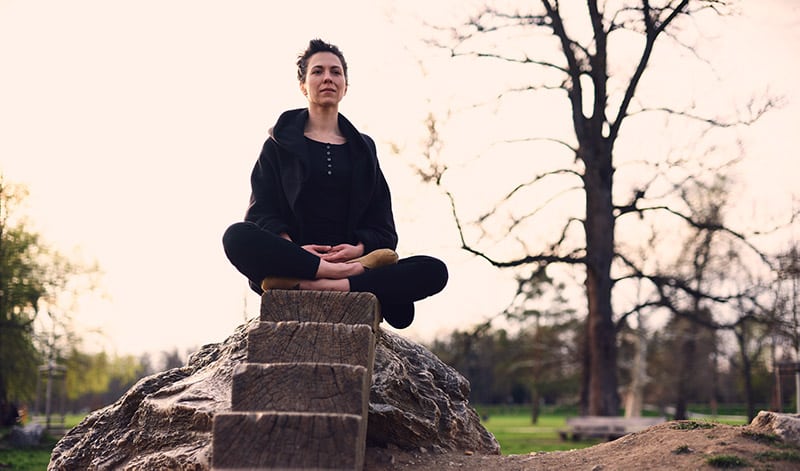The Meaning of Mindfulness and Awareness
Category: Buddhist Meditation | Mindfulness and Awareness | Popular

Mindfulness and awareness are the foundations of meditation. But what’s the difference? If the term “mindfulness” is now part of the zeitgeist, “awareness” is somewhat harder to pin down.
In the context of meditation, both mindfulness and awareness are essential. In fact, the journey to understanding the mind and how to work with it is based on the synergy between the practices of mindfulness and awareness. Let’s have a closer look.
About mindfulness
Mindfulness has to do with fully and openly embracing the present moment. Sounds simple, right? But if you think about it, we spend our time doing anything but. First of all, to embrace the present moment you’ve got to be able to recognize it, whereas most of the time we’re pulled into the future by our hopes and fears, or we ruminate about the past and what needs to happen again or what should have been different. Or we simply give in to our dependence on distractions and daydreams to get us through.
But none of that’s real. The past is gone and the future never unfolds how we imagined it. The only thing that’s real in any way is the here and now. By making friends with stillness and presence, we learn that the here and now is much more satisfying than we suspected. In fact, it’s all we’ve got and it’s all we need.
When we practice mindfulness meditation, we’re training in recognizing the thoughts, sensations and emotions that arise in the moment and letting them pass by like clouds in a blue sky. To do this, we settle the mind on a focal point that is decidedly in the here and now, such as the rhythm of breathing or immediate physical sensations. Every time we realize that the mind has drifted away from its focal point, we gently but firmly bring it back. With a little practice, this form of meditation becomes a haven, a homecoming.
The mindful process teaches us that we may not be able to shape the world to our specifications, but we can definitely do something about how we interact with it. It helps us see our place in the world and is, as famed Buddhist teacher Pema Chödrön puts it, “a sense of clear seeing with respect and compassion for what it is we see. This is what basic practice shows us. But mindfulness doesn’t stop with formal meditation. It helps us relate with all the details of our lives. It helps us see and hear and smell, without closing our eyes or our ears or our noses. It’s a lifetime’s journey to relate honestly to the immediacy of our experience and to respect ourselves enough not to judge it.”
Esteemed meditation teacher Rachel Parrish says that there’s something very wholesome that happens when you declutter your mind – you release all those unrealistic expectations that you’ve been desperately clinging to. Such expectations often lead to negative emotions such as anxiety, disappointment and stress. Mindfulness is simply the process of letting go and casting away your fears, worries and anxieties. When you meditate mindfully, she says, you’re filled with more peace and awareness. For a more detailed perspective, check out how advanced meditation teacher Khaydroup Podvoll defines mindfulness practice.
About awareness
And speaking of awareness, in the context of meditation, what is it? While every form of meditation requires awareness, awareness meditation refers to a specific method that is also referred to as insight meditation. Calling upon the qualities of presence developed through mindfulness practice, awareness meditation (called vipashyana in Sanskrit) is an active investigation into the nature of mind and how it functions.
With mindfulness, we learn to recognize and acknowledge what’s going on in the mind, moment by moment, without judgment and with benevolence, and to let it go. With awareness, we use our awareness of the thoughts, emotions and sensations that arise in the mindstream as the actual focal point of the meditation. Perhaps we could say we explore the gaps between those thoughts, to discover a more spacious state of mind. Or, we can actively investigate the nature of these mental events. It may sound like an intellectual exercise, but when practiced properly, awareness meditation circumvents intellectual ponderings and provides direct insight into the nature of mind. Mindfulness (shamatha) and awareness (vipashyana) are best when practiced in an interconnected way as a continuum.
Discovering the true source of happiness
Since childhood, we’ve always been encouraged to examine things outside of ourselves; the emphasis has rarely been to search within ourselves. Trinlay Rinpoche, a meditation master and scholar who teaches all over the world, confirms that the true source of our happiness and well-being cannot be found outside of us – it comes from deep within. Meditation helps us examine ourselves gradually and methodically. As we gain a deeper sense of self awareness, we stop being strangers to ourselves and naturally develop more compassion, patience and resilience. For more on this read Trinlay Rinpoche’s article Does Meditation Make You Happy?
When it comes to practice, consistency is of paramount importance. If you’re new to meditation, you might start with 5-minute sessions and work your way up. Check out our free eBook on Getting the Most out of Meditation.






